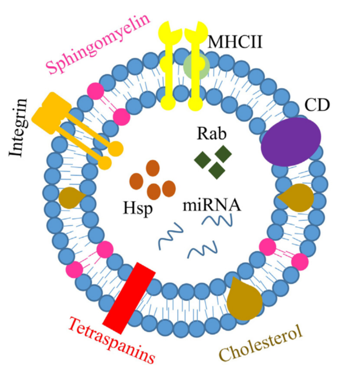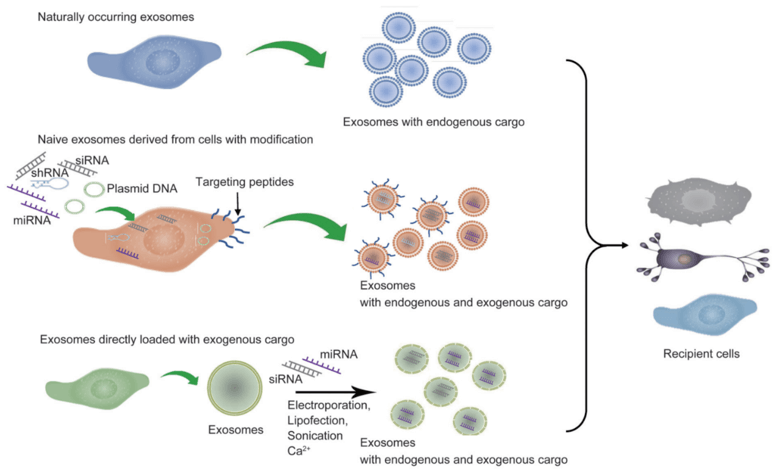Exosome Cargo Loading Services
Cargo Services Approaches FeaturesFAQs
Exosomes have attracted great interest because they participate in pathophysiological processes and have the obvious intrinsic ability to transport a variety of biomolecules between different tissues, organs and cells. As some studies have emphasized, successful loading of therapeutic drugs, from synthetic oligonucleotides to small molecule compounds to viral vectors, can be achieved. Optimizing the loading technology of exosomes will reduce costs and improve productivity, which is an important factor for exosomes to enter the field of treatment.
Cargo Loading into Exosomes
Exosomes naturally carry various types of proteins, lipids, and nucleic acids (mRNA and non-coding RNA), playing a vital role in cell-to-cell communication. Furthermore, exosomes exhibit desirable features of an ideal drug delivery system, such as a high delivery efficiency, long circulating half-life, the intrinsic ability to target tissues, biocompatibility, and minimal or no inherent toxicity issues. Importantly, exosomes own intrinsic homing capacity that can guide therapeutic cargo across natural membranous barriers, such as the blood-brain barrier (BBB), to achieve better therapeutic efficiency of brain diseases. Hence, it is logical to use exosomes as vehicles to deliver therapeutics to target cells. Before they are delivered, exosomes should be loaded with different therapeutic cargo, such as small molecules, proteins, and nucleic acids.
 Fig.1 Composition of exosomes. (Ha, 2016)
Fig.1 Composition of exosomes. (Ha, 2016)
Cargo Loading Services in Creative Biolabs
Proteins - In addition to loading with small molecules, a key component of our exosome engineering services involve loading with large molecules such as proteins. The proteins can be engineered and targeted onto the surfaces of exosomes, which enables surface display of proteins and tissue targeting. Besides, proteins can also be loaded inside the exosomes for therapeutic delivery, leveraging both the natural properties of exosomes and the specificity of biological molecules.
Nucleic acids - Small interference RNA (siRNA), miRNA, short hairpin RNA (shRNA), and other nucleic acids can be incorporated into exosomes using different strategies. Numerous studies have employed exosomes from different sources as carriers of small RNAs to treat various diseases, especially brain diseases and tumors. These therapeutic genetic materials are delivered to alter gene expression and improve genetic therapy.
-
siRNA is used to disrupt genes of interest in genetic therapy. Because siRNAs have low stability and tend to degrade quickly in systemic circulation, exosomes are used as vehicles that help in the protection and delivery of siRNA to target cells.
-
miRNA is a short form of non-coding RNA and it binds to complementary sequences on target mRNA and control post-transcriptional gene expression. Thus, miRNA-loaded exosomes are used to modify the expression of specific genes, thereby treating specific diseases.
 Fig.2 Cargo loading of exosomes for therapeutic purposes. (Li, 2018)
Fig.2 Cargo loading of exosomes for therapeutic purposes. (Li, 2018)
Approaches for Cargo Loading into Exosomes
Several distinct approaches can be utilized at Creative Biolabs for cargo loading into exosomes:
-
Post-loading Strategy
Exosomes can be directly loaded with exogenous nucleic acids or drugs by electroporation, lipofection, sonication, and calcium chloride.
-
Pre-loading Strategy
Loading parental cells with the exogenous cargo, which is then released into exosomes.
Features of Cargo Loading Services in Creative Biolabs
-
Expert scientists and staff that work closely with customers to provide satisfying service support
-
Streamlined services from consultation and project design, to product production and data interpretation
-
Ensured high quality, consistent reproducibility, and timeliness of delivery
-
Amenable to different downstream applications and research purposes
Backed by our expert scientists and technology platform, we can provide custom-specific cargo loading services of proteins, nucleic acids, and small molecules of interest. If you are interested in our services, contact us or inquire us to discuss your project requirements.
Reference
-
Choi, D. S.; et al. Proteomics, transcriptomics and lipidomics of exosomes and ectosomes. Proteomics. 2013, 13(10-11): 1554-1571.
FAQs
How can exosomes be loaded with cargo for specific applications?
Exosomes can be loaded with cargo using various techniques such as electroporation, incubation with cargo-containing solutions, or engineering cells to produce exosomes with desired cargo. These methods allow for precise loading of therapeutic molecules or diagnostic agents into exosomes for targeted delivery.
What types of cargo can be loaded into exosomes?
A wide range of cargo, including small molecules, nucleic acids (DNA, RNA), proteins, and even nanoparticles, can be loaded into exosomes. This versatility enables the delivery of therapeutics, such as drugs or gene therapies, as well as the development of exosome-based diagnostics and imaging agents.
How does cargo loading affect exosome stability and functionality?
Cargo loading methods can influence the stability and functionality of exosomes. Careful optimization of loading techniques is crucial to maintain exosome integrity and ensure cargo stability during storage and delivery. Properly loaded exosomes retain their ability to interact with target cells and mediate therapeutic effects.
Can exosome cargo loading be customized for specific research needs?
Yes, exosome cargo loading services offer customization options to meet diverse research needs. Researchers can tailor cargo selection, loading methods, and exosome modifications to achieve desired therapeutic or diagnostic outcomes. This flexibility allows for the development of innovative solutions in drug delivery and precision medicine.
What are the potential applications of exosome cargo loading in drug development?
Exosome cargo loading holds promise for various applications in drug development, including targeted drug delivery, immunotherapy, regenerative medicine, and biomarker discovery. By harnessing the natural properties of exosomes and customizing their cargo, researchers can advance the development of novel therapeutics and diagnostics with enhanced efficacy and specificity.
For Research Use Only. Cannot be used by patients.
Related Services:

 Fig.1 Composition of exosomes. (Ha, 2016)
Fig.1 Composition of exosomes. (Ha, 2016)
 Fig.2 Cargo loading of exosomes for therapeutic purposes. (Li, 2018)
Fig.2 Cargo loading of exosomes for therapeutic purposes. (Li, 2018)








